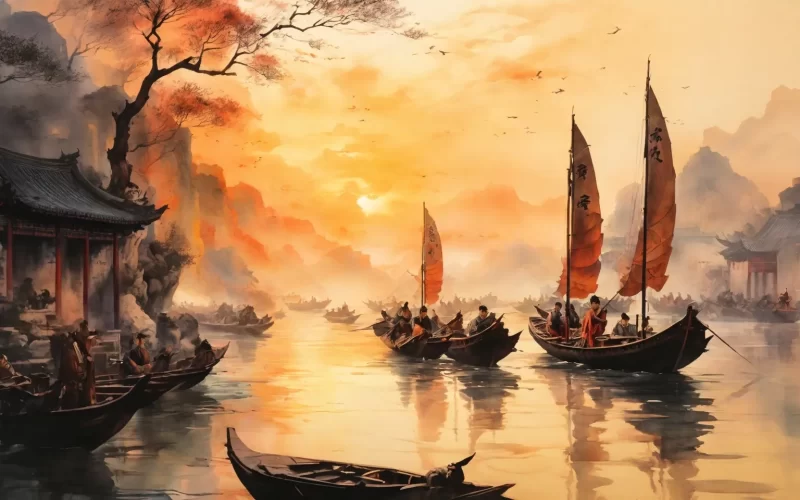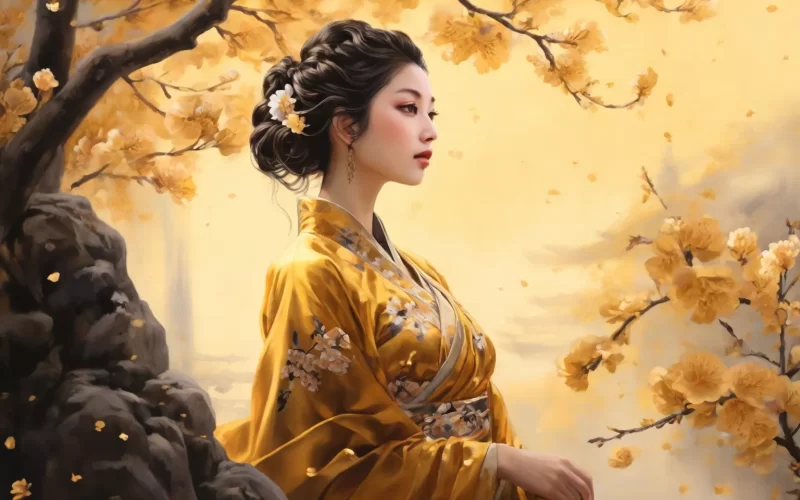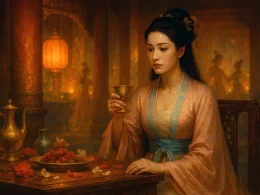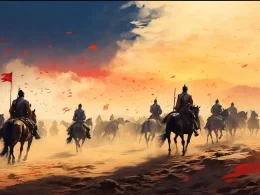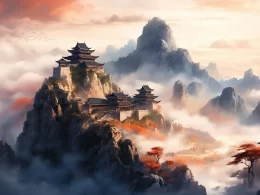"Yes, I live here, by the river;
I have sailed on it many and many a time.
Both of us born in Changgan, you and I!
Why haven't we always known each other?"
Original Poem:
「长干行 · 其二」
崔颢
家临九江水,来去九江侧。
同是长干人,生小不相识。
Interpretation:
This poem is the second excerpt from Changgan Xing in Yuefu Shiji · Miscellaneous Songs and Ballads. It describes a conversation between a young man and a young woman who meet by chance in a riverside town. Through their exchange, the poem conveys the warmth and familiarity that can arise from shared origins, while also subtly hinting at an unspoken sentiment. The emotions expressed are sincere, and the language is simple, reflecting both a deep nostalgia for home and a sense of helplessness in the face of life's drifting nature.
First Couplet: “家临九江水,来去九江侧。”
jiā lín jiǔ jiāng shuǐ, lái qù jiǔ jiāng cè.
"My home is by the waters of Jiujiang, / I come and go along the Jiujiang shores."
The young man’s response is plain yet direct, establishing his close connection to the riverside life. His words not only depict his environment but also suggest a life of constant movement, much like the young woman’s. The imagery of water and boats reinforces the poem’s regional flavor, immersing the reader in the daily existence of those who dwell by the river.
Second Couplet: “同是长干人,生小不相识。”
tóng shì cháng gān rén, shēng xiǎo bù xiāng shí.
"We are both from Changgan, yet we never knew each other in childhood."
Upon realizing their shared hometown, the young man expresses a faint sense of regret—though they are from the same place, fate has kept them apart until now. On the surface, these lines lament a missed connection, but they also reveal a deeper sense of familiarity and recognition. This subtle emotional undercurrent gives the poem a delicate, heartfelt charm.
Overall Appreciation
At first glance, this poem appears to be a simple dialogue, yet it carries rich emotional layers. The young woman initiates the conversation, while the young man responds in a candid but meaningful way. Although they have never met before, the shared hometown and dialect create an instant bond, evoking the joy of encountering a familiar presence in an unfamiliar place. The poet masterfully uses the riverside setting to enhance the poem’s tone—both warm and tinged with a hint of wistful longing—making the emotions feel all the more genuine.
Beyond personal emotions, the poem also reflects a deep nostalgia for home and the transient nature of life. For those who wander far from home, familiar accents and shared origins can evoke profound feelings of belonging. This universal sentiment allows the poem to transcend a simple meeting between two people and resonate with a broader human experience.
Writing Features
- Plain yet vivid language: The poem employs simple, everyday expressions to create a realistic and natural conversation, making the scene feel authentic.
- Subtle yet profound emotions: Although no explicit statements of longing or affection are made, the themes of hometown recognition and life’s fleeting nature are naturally woven into the verses.
- Strong regional characteristics: The setting of Jiujiang and Changgan, along with the depiction of river life, lends the poem a distinct local flavor, enriching its imagery.
- Blending scenery with emotion: The contrast between the ever-moving river and the missed connection of two people highlights both the beauty of the landscape and the underlying sentiment of the poem.
Insights
This poem beautifully illustrates the natural warmth that arises when two strangers recognize a shared homeland. It also reflects the reality of a drifting life in ancient times, where people often longed for stability but found themselves constantly on the move. The sense of connection that comes from a familiar voice or a common origin remains deeply relevant even today. It reminds us that home is not just a physical place but also an emotional anchor. Amid the rush of life, sometimes it is the simplest encounters—a conversation, a shared memory—that bring the deepest sense of belonging.
Poem translator:
Kiang Kanghu
About the poet:
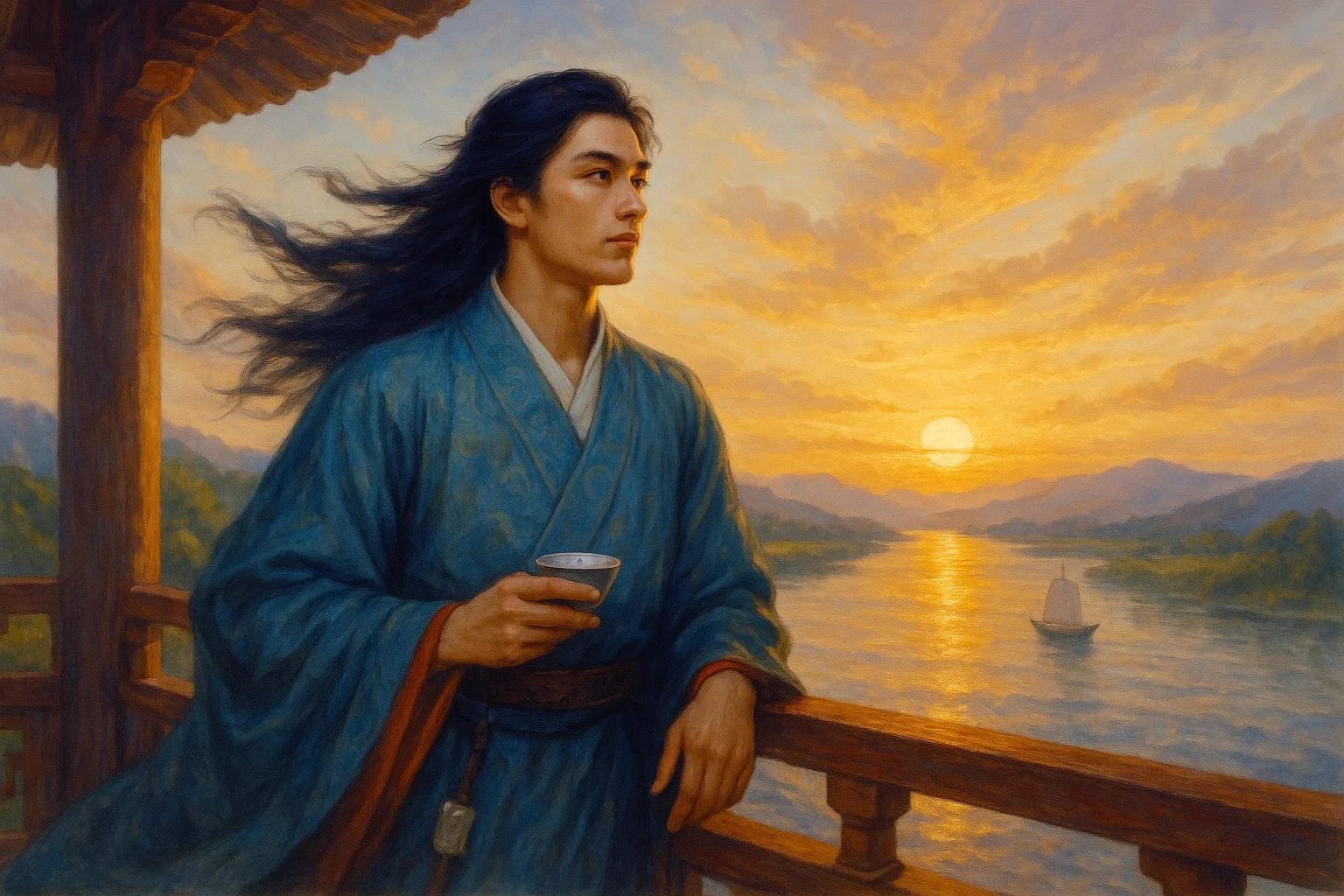
Cui Hao (崔颢), A.D. ? – 754, a native of Kaifeng, Henan Province. He was admitted as a scholar in 723 AD. At that time, Cui Hao was well known, along with Wang Changling, Gao Shi, Meng Haoran, and Wang Wei.






